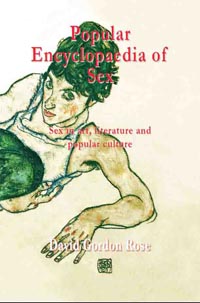 Popular Encyclopaedia of Sex: Sex in art, literature and popular culture Popular Encyclopaedia of Sex: Sex in art, literature and popular cultureDo you know the meaning or significance of:- anal felching, bad boy syndrome, camp names, bicycle dildo, eco-sexual, female ejaculation, grinder, handkerchief code, impotence, Jezebel, Kinsey, lindinism, metrosexual, nappy house, onanism, priapism, quickie, Rubenesque, seagulling, tryst, up-skirt, Viagra divorce, witan, x-rated, YouTube and zoophilia? This work is a comprehensive, informative, horizon-broadening examination of sexual matters. It is factual, humorous, historical, provocative and occasionally erotic. Material is drawn from sources including academic, anecdotal, literary, film, the Internet and popular culture. The book will be recommended reading for young adults upwards. You will be enlightened, as I am in the process of writing it. This work is a comprehensive, informative, horizon-broadening examination of sexual matters. It is factual, humorous, historical, provocative and occasionally erotic. Material is drawn from sources including academic, anecdotal, literary, film, the Internet and popular culture. The book will be recommended reading for young adults upwards. You will be enlightened, as I am in the process of writing it. There is a physical limit of 800 or so pages in this book size so the first edition of the encyclopaedia will probably be published as a single volume. One major problem is that entries will have to be short, much shorter than my sample below. Read a sample here:
"As for Comedy," Dryden writes, "repartee is one of its chiefest graces; the greatest pleasure of the audience is a chace of wit, kept up on both sides, and swiftly managed." If the opponents in such a chase are male and female and the exchange is to be kept up, the lady must be as articulate as the gentleman (Moore 1963). Theatre audiences of the Restoration (i.e., post-1660) were made up of London's elite. The emphasis was on repartee and the clever language heard in the best social circles, language which could be considered highly vulgar (crude in expression and content) today. One reason for a vigorous male-female exchange in Sixteenth- and Seventeenth-century theatre was the belief that for conception to occur, the female had to be as aroused as the male to the point of emitting her own "seed". The dynamic energy and clever, continuous repartee of the erotic dialogues in Shakespeare's comedies would have been expected by audiences of a stage couple edging towards a sexual peak (Greenblatt 1988). Dryden was criticized in his day for obscenity in his plays. He was unashamedly writing what people wanted to hear, playing to memory of the austerity and censorship of Cromwell's Puritan regime See also the following: sexual correspondence "When, where, how much?" the nobleman's note read. "Tonight, your place, free ..." came a measured reply. In the original language the notes read, "Quand, où, combien?" and the reply "Ce soir, chez toi, sans frais ..." How much more sensuous is the exchange in French. There won't be such a striking difference between male and female in every question and answer, of course. Here the writer, rather than the couple, demonstrates that the language of love probably is French and not the monotonous English, or other Germanic languages. Out of curiosity I translated it into Italian and was surprised with the reversal. The brusque, even desperate question is now a seductive masculine request with business-like feminine response. "Quando, dove, quanto?" "A serra, a casa, liberamente ..." All translation is mine. If not entirely idiomatic it shows this sexual correspondence is also a good example of eroticism if disguised as a business transaction. See also love letter; poetry; sexting; writing |